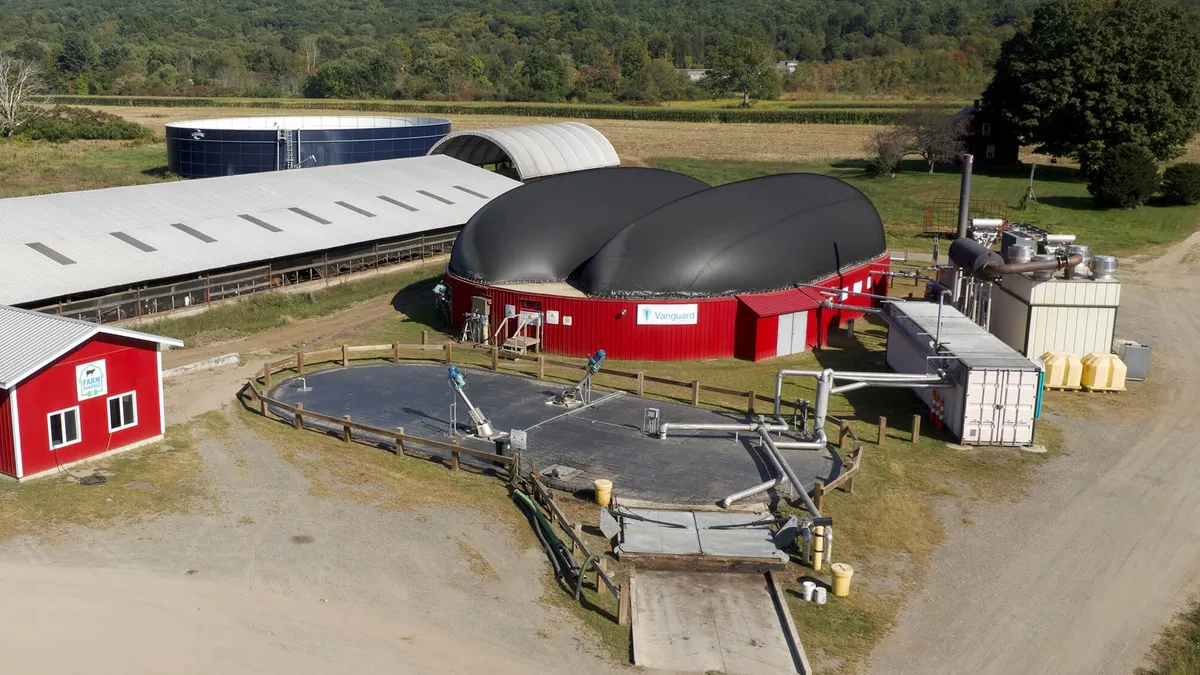Dive Brief:
-
Dominion Energy announced a $200 million partnership with dairy and food waste energy company Vanguard Renewables on Wednesday to develop five renewable natural gas projects.
-
The announcement follows the creation last year of Align Renewable Natural Gas (RNG) — a joint venture between the utility and Smithfield foods. The two companies in October announced they would spend a combined $500 million on renewable natural gas projects through 2028, doubling their previous investment.
- The projects with Vanguard, sited in Georgia, Nevada, Colorado, New Mexico and Utah, are expected to wrap up development and begin operations in the next five years or sooner, Dominion spokesperson Aaron Ruby told Utility Dive. The projects will produce a collective 1 billion cubic feet of RNG.
Dive Insight:
Renewable natural gas is created through trapping the methane emitted by manure and food waste and upgrading it as a fuel to burn. States like Minnesota have been exploring the option as a viable way to cut carbon emissions from buildings, though some critics say investment in electrification is a better, lower emissions route.
Dominion's partnership with Vanguard is not a direct RNG service to Dominion customers, rather Dominion is acting as the capital partner, investing in, owning and marketing the projects, while Vanguard, the largest waste-to-energy company in the Northeast, will design, develop and operate the projects. Though Vanguard's anaerobic digesters typically can include manure or food waste, or a combination of both, this project will focus exclusively on manure-to-energy, according to Ruby.
Driving the utility's gas arm to invest in such projects is customer demand for lower emitting gas, including large commercial and industrial customers, said Ruby. A dairy RNG production would include 20,000 to 30,000 cows, where the manure is processed through Vanguard's anaerobic digesters, capturing the methane that would have otherwise been emitted. The process cuts emissions from agricultural operations and opens up an additional revenue stream for those farms as well.
CenterPoint Energy proposed a renewable natural gas option for its customers in August 2018, which was later rejected by Minnesota regulators in June. Vermont Gas and Southern California Gas Company both have voluntary programs as well, though the practice overall is not very widespread. But interest is growing as the utility and transportation sectors push to decarbonize, Matt Tomich, president of waste energy advocacy group Energy Vision told Utility Dive.
"The norm historically was for utilities to ... do everything they could to make it difficult for biogas producers, whether that be agricultural projects or landfill projects or others, to get access to the pipeline network," he said.
But now, more utilities are open to the idea as consumer demand for lower-emission fuels is growing. And partnerships are a boon to farmers as well.
"The dairy industry in particular has struggled from depressed milk prices and overall challenging economics for the last several years," said Tomich. "And so to us, this is also another kind of source of income and a new way to improve on farm economics."
Correction: The five projects will produce 1 billion cubic feet of RNG in total.















